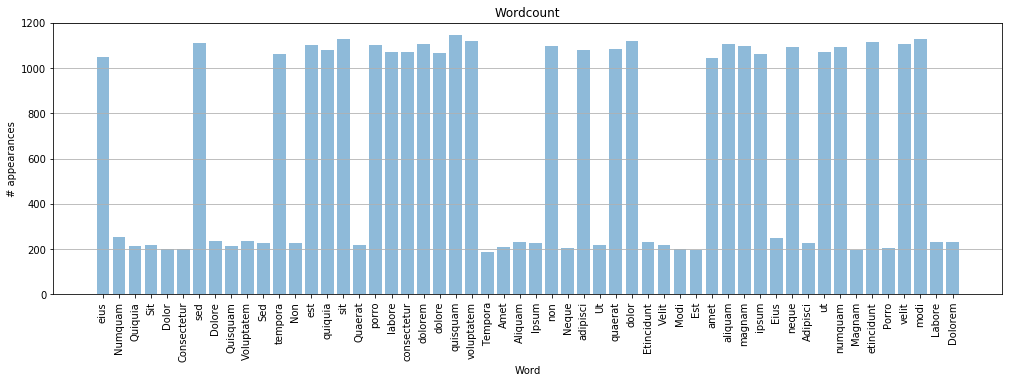Wordcount
Counts the number of appearances of each word from a set of files.
[1]:
import pycompss.interactive as ipycompss
[2]:
import os
if 'BINDER_SERVICE_HOST' in os.environ:
ipycompss.start(graph=True, trace=True, debug=False,
project_xml='../xml/project.xml',
resources_xml='../xml/resources.xml')
else:
ipycompss.start(graph=True, monitor=1000) # trace=True
******************************************************
*************** PyCOMPSs Interactive *****************
******************************************************
* .-~~-.--. _____ ________ *
* : ) |____ \ |____ / *
* .~ ~ -.\ /.- ~~ . ___) | / / *
* > `. .' < / ___/ / / *
* ( .- -. ) | |___ _ / / *
* `- -.-~ `- -' ~-.- -' |_____| |_| /__/ *
* ( : ) _ _ .-: *
* ~--. : .--~ .-~ .-~ } *
* ~-.-^-.-~ \_ .~ .-~ .~ *
* \ \ ' \ '_ _ -~ *
* \`.\`. // *
* . - ~ ~-.__\`.\`-.// *
* .-~ . - ~ }~ ~ ~-.~-. *
* .' .-~ .-~ :/~-.~-./: *
* /_~_ _ . - ~ ~-.~-._ *
* ~-.< *
******************************************************
* - Starting COMPSs runtime... *
* - Log path : /home/user/.COMPSs/Interactive_01/
* - PyCOMPSs Runtime started... Have fun! *
******************************************************
[3]:
from pycompss.api.task import task
from pycompss.api.parameter import *
[4]:
@task(returns=dict, file_path=FILE_IN)
def word_count(file_path):
"""
Read the given file and construct a frequency word dictionary from a list of words.
:param data: a list of words
:return: a dictionary where key=word and value=#appearances
"""
# Read the given file
data = []
with open(file_path, 'r') as f:
for line in f:
data += line.split()
# Parse the content
partialResult = {}
for entry in data:
if entry in partialResult:
partialResult[entry] += 1
else:
partialResult[entry] = 1
return partialResult
Found task: word_count
[5]:
@task(returns=dict, priority=True)
def merge_two_dicts(dic1, dic2):
"""
Update a dictionary with another dictionary.
:param dic1: first dictionary
:param dic2: second dictionary
:return: dic1+=dic2
"""
for k in dic2:
if k in dic1:
dic1[k] += dic2[k]
else:
dic1[k] = dic2[k]
return dic1
Found task: merge_two_dicts
Main wordcount code:
[6]:
from pycompss.api.api import compss_wait_on
# Get the dataset path
path_dataset = os.getcwd() + '/dataset'
# Construct a list with the file's paths from the dataset
partial_result = []
for file_name in os.listdir(path_dataset):
f = os.path.join(path_dataset, file_name)
partial_result.append(word_count(f))
# Accumulate the partial results to get the final result.
result = {}
for partial in partial_result:
result = merge_two_dicts(result, partial)
# Wait for result
result = compss_wait_on(result)
Now lets see the results:
[7]:
from pprint import pprint
print("Result:")
pprint(result)
print("Total words: {}".format(sum(result.values())))
Result:
{'Adipisci': 227,
'Aliquam': 233,
'Amet': 207,
'Consectetur': 201,
'Dolor': 198,
'Dolore': 236,
'Dolorem': 232,
'Eius': 251,
'Est': 197,
'Etincidunt': 232,
'Ipsum': 228,
'Labore': 229,
'Magnam': 195,
'Modi': 201,
'Neque': 205,
'Non': 226,
'Numquam': 253,
'Porro': 205,
'Quaerat': 217,
'Quiquia': 212,
'Quisquam': 214,
'Sed': 225,
'Sit': 220,
'Tempora': 189,
'Ut': 217,
'Velit': 218,
'Voluptatem': 235,
'adipisci': 1078,
'aliquam': 1107,
'amet': 1044,
'consectetur': 1073,
'dolor': 1120,
'dolore': 1065,
'dolorem': 1107,
'eius': 1048,
'est': 1101,
'etincidunt': 1114,
'ipsum': 1061,
'labore': 1070,
'magnam': 1096,
'modi': 1127,
'neque': 1093,
'non': 1099,
'numquam': 1094,
'porro': 1101,
'quaerat': 1086,
'quiquia': 1079,
'quisquam': 1144,
'sed': 1109,
'sit': 1130,
'tempora': 1064,
'ut': 1070,
'velit': 1105,
'voluptatem': 1121}
Total words: 35409
Plot the results:
[8]:
%matplotlib inline
import matplotlib.pyplot as plt
import numpy as np
import matplotlib.pyplot as plt
words = result.keys()
y_pos = np.arange(len(words))
appearances = result.values()
plt.rcParams['figure.figsize'] = [17, 5]
plt.bar(y_pos, appearances, align='center', alpha=0.5)
plt.grid(axis='y')
plt.xticks(y_pos, words, rotation=90)
plt.ylabel('# appearances')
plt.xlabel('Word')
plt.title('Wordcount')
plt.show()

[9]:
ipycompss.stop()
****************************************************
*************** STOPPING PyCOMPSs ******************
****************************************************
Warning: some of the variables used with PyCOMPSs may
have not been brought to the master.
****************************************************

